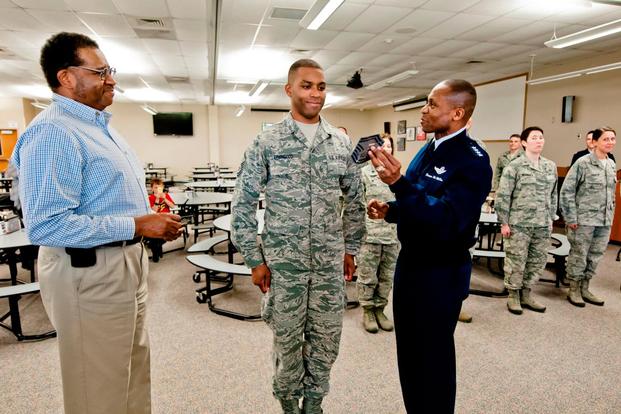The U.S. Air Force rolled out a new enlisted personnel handbook Thursday, in which it streamlines promotion requirements for master sergeants and makes it a bit easier to address senior master sergeants.
The service will no longer require an associate's degree from the Community College of the Air Force as a promotion requirement for master sergeants, said Chief Master Sergeant of the Air Force Kaleth O. Wright.
"One of the biggest changes you'll see, one that we're also working to codify in our other [Air Force Instructions], comes in [paragraph] 3.1.3.1.: An Associate's Degree from the CCAF is no longer a promotion requirement," he said on his Facebook page.
"Instead, the verbiage now reads 'MSgts must complete an Associate's Degree or higher from a regionally accredited academic institution, if not already earned, to become eligible for promotion to [senior master sergeant],' " he said, quoting the new Air Force Handbook 36-2618, "The Enlisted Force Structure."
Related content:
- Air Combat Command Wing Removes Group, Vice Commanders in Experiment
- Air Force Looks to 'Team' Deploying Airmen in Specialty Jobs
- Air Force to Let Fighter Pilots, Crew Stay at Preferred Bases
Previously, master sergeants were required to complete the CCAF degree in their current Air Force Specialty Code (AFSC), if not already earned.
The new handbook replaces the 2009 Air Force Instruction of the same name.
The changes are part of a widespread effort to reduce red tape across the force, including amendments to dated or arbitrary verbiage.
"We are continuously assessing our programs and policies, looking for ways to allow airmen to keep focus on the mission, and to eliminate unnecessary or redundant requirements," Air Force spokesman Senior Master Sgt. Harry Kibbe told Military.com.
A second, popular change is how airmen may address their top-tier enlisted leaders.
From now on, airmen may address E-8s as "senior" or "sergeant," according to the handbook.
Though airmen were previously not allowed to address E-8s as "senior" per the 2009 AFI, some units have been slowly phasing the practice in an effort to honor higher-ranking enlisted leaders.
"Thank you for allowing 'Senior' to be added to the proper terms of address for Senior Master Sergeant," one airman posted on Wright's Facebook announcement.
"Awesome to see 'Senior' official! Way overdue! The first person to call me Senior was a Chief and I've done the same for others since sewing on Chief in 2013," wrote another. "As many have said, thank you Chief for allowing such simple sensible changes, being real, and doing the right thing!"
The service also added a section detailing various career special duties.
Staff sergeants through master sergeant have the opportunity to serve in one of 10 developmental special-duty positions, often described as mentoring opportunities. Jobs include academy military training noncommissioned officers, dorm leaders, airman and family readiness center noncommissioned officers, first sergeants, and Honor Guard, among others.
Kibbe said the new section provides additional information for airmen who may want to pursue the mentoring roles, including the nomination process and how to work with their commanders to fill these critical positions.
Wright said the changes are meant to address long-standing needs.
"One of the first questions at one of my first all-calls after taking the seat was from a young airman who wanted to know when 'the Air Force' was going to update the Enlisted Force Structure," he said Thursday. "Our team didn't forget about that airman or any of the others who asked" about these initiatives.
"You asked, we listened," Wright said.
-- Oriana Pawlyk can be reached at oriana.pawlyk@military.com. Follow her on Twitter at @Oriana0214.









